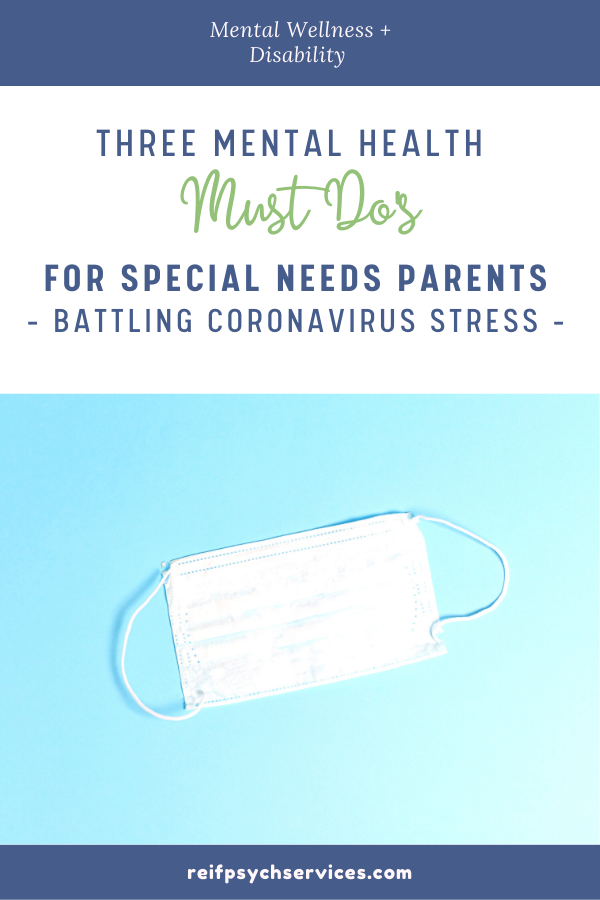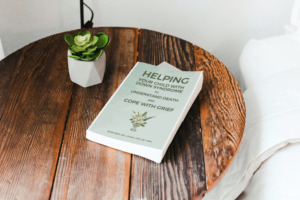Your child is simply demanding more of you in light of the changes and uncertainty. If you’re like my counseling clients who are special needs parents, you’re realizing that this is wreaking havoc on your own mental health. Hopefully, you’ve recognized that you can’t sustain this level of caring for others without devoting some time and energy to meeting your own mental health needs.
That’s why I’m sharing my three best strategies for special needs parents battling coronavirus stress in this post.

1. Take a break…from vigilance
Studies like this one highlight that vigilance, that feeling of constantly being ‘on’, is one of the most exhausting parts of raising kids with special needs.
You know the feeling. There is never a moment that you aren’t listening, smelling, predicting, calculating. Because at any moment your child may scream, hit, run, seize, or otherwise need you. You are always prepared to drop what you’re doing to meet your child’s needs. Vigilance is to blame for countless burned dinners and missed yoga classes.
Maybe it’s not surprising that vigilance is also responsible for many of the mental health issues that parents raising kids with disabilities are prone to. Anxiety and depression can develop when parents feel unable to escape this need for intense awareness.
Many of my counseling clients have learned that it is NOT ENOUGH to take a break from being the ‘primary parent.’
Sneaking into your bedroom or the garage for 10 interrupted minutes is not the secret to recovering your mental health.
Because no matter what you do, if you are in close proximity to your child, you will never fully surrender that vigilance. You’ll always be listening, aware of what’s going on.
And let’s be real, they’ll come find you. Every. Single. Time.
And if you aren’t fully free from vigilance, then you aren’t really taking a break from what’s exhausting you most.
So, start taking real breaks. Completely disengage from awareness of what your children are doing.
This will mean getting out of the house and leaving your child with your partner.
What you do outside of the house doesn’t matter. Go for a walk or call a friend. Park your car on the next street over and read a book, listen to a guided meditation, or just take a nap.
During this uncertain time, it is essential that you take at least 30 minutes of day to be free from vigilance.
Important reminders
Don’t wait until the end of the day, when your child is preparing for bed or already asleep to take this break. Insist upon this time for yourself right smack in the middle of the day. Because that’s when you need it the most.
You should also not plan to use this time to have a telehealth session with your child’s psychologist, or to read a parenting book. Make this time about your needs, not your child’s.
You are devoted to awareness of your child the other 23.5 hours a day. You can take 30 minutes just for you. It’ll be ok.
*If you’re a single parent, or if your partner is unable to safely supervise your children, it may not feel possible to take this time away during the quarantine.
Just as many people are realizing in the wake of this pandemic that they need to better prepare for financial emergencies, I hope that this time is showing you how important it is to be equipped to handle support emergencies.
Talk with your friends, your therapist, your family, your neighbors, your spiritual leader, your co-workers, your child’s teachers.
Talk to anyone you can think of who can help you develop a strong support network so that you do not bear the burden of 24/7 vigilance any longer.
2. Avoid ‘ize’-ing
Specifically, avoid castatrophizing and personalizing.
Let’s say your child with special needs hits their sibling.
Catastrophizing is convincing yourself that:
- You can never trust them alone together
- Your children will never have a close relationship
- Your special needs child will never learn better ways to behave
Yet none of these things are necessarily true. And they’re certainly not true just because of what has happened in the last 5 minutes.
What is true is that your child’s behavior is their primary way of communicating both their needs and their wellness.
Always, but especially during this quarantine, we must remember that many behaviors are children’s responses to stress. When children react to stress, they are not considering and intentionally choosing their behavior. They are acting purely out of autonomic nervous system distress.
Their distress is caused not just by their interaction with their sibling, but also the immense stress of the global uncertainty that we are all living in right now.
Challenging behaviors don’t reflect that your child will never develop the ability to tolerate distress. They simply mean that your child needs your help to regain their control over their behavior right now.
Focus on helping your child to regulate their behavior in this moment. Soothe them. Validate the feelings that led to the behavior. You know that trying to reason with them about their behavior will not be productive right now. Your child must be regulated before they can reason.
Most importantly, fight against the anxiety telling you that it will always be this way.
Related to this, know that many children are having more anger and explosive outbursts right now. And it’s not surprising that this is happening.
Unfortunately a child expressing intense anger or having an explosive outburst causes many parents to feel inadequate. Parents feel hopeless and wonder “What should I have done differently? What haven’t we tried yet?” They convince themselves “I must be doing something wrong.”
This is personalizing. It is believing, falsely, that your child’s outburst is about you, and more specifically about your failures.
Let me assure you, your child’s outbursts and anger at this time likely has very little to do with you. Instead, it reflects your child’s awareness that things are uncertain, that the world is scarier and very different than how it was just weeks ago.
They are angry about face masks and remote learning and not being able to go to the playground. They may say “I hate you”. What they cannot articulate, but what is at the root of this statement is “I feel scared, especially because I know that you do, too.”
If you want to learn more about the brain science behind challenging behavior, I absolutely recommend that you read Beyond Behaviors by Dr. Mona Delahooke. Just not during your 30-minute vigilance break.
3. Lower the bar
Lower it so low. Dig a hole and bury the bar and then forget where you put it.
If ever there was a time to lower your expectations both of yourself and of your child, this is it.
Just because you are home more does not mean that this is the right time to do more. Instead ask yourself the critical question “what can I let go of?”
Maybe it’s something small, like the tension in your jaw.
*Go ahead and loosen your tongue from the roof of your mouth, roll your neck, and take a deep breath out and then in. Doesn’t that feel incredible?
Perhaps what you can let go of is something tangible. Eating on paper plates a few nights a week to save yourself from constantly loading and unloading the dishwasher. Letting your child wear pajamas all day.
For many special needs parents, the most helpful thing to let go of is the pressure to meet your own high expectations.
It’s a concept that often comes up during my counseling sessions with parents raising kids with disabilities.
My clients often recognize during counseling that much of the pressure they feel to do more, to be more, is coming from within.
Realizing this gives these special needs parents the freedom to consider what it is that they truly value, without worrying about what others think about their choices. It empowers them to recognize their own needs with greater clarity, and to meet them without judgment.
So, instead of being pissed off at yourself that you feel tired when the alarm goes off at 5am, listen to your body’s insistence that it is tired. Give yourself the rest you need. There will be coffee to drink and news to read and dishes to wash at 7am, too.
Summary
In this time of uncertainty, it is easy to feel powerless.
My hope is that these three mental health strategies will help you regain awareness of the choices that you have every day. Even if you can’t keep track of which day it is, because they’re all starting to run together.
I hope that you will choose to meet your own mental health needs, instead of sacrificing your own wellness to take care of everyone else again and again.
If that feels hard for you, and you’d like to talk to someone who’s helped lots of other parents like you, I invite you to learn more about my counseling services for parents raising kids with disabilities.












